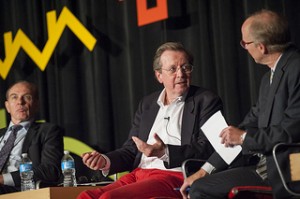In collaboration with the Institute for Government and the University of the West of England, researchers at the School for Policy Studies hosted a debate featuring the directly elected mayors of Bristol and Leicester. Tom Gash, from the Institute gives his thoughts on the debate in a post that was first published on the Institute’s blog. 
Elected in 2011 and 2012 respectively, George Ferguson (Bristol) and Sir Peter Soulsby (Leicester) have been working hard to show what mayors can do for our cities. At a recent event hosted at the Institute for Government, Tom Gash heard them raise two questions that any government after May 2015 will have to answer. Should we have more mayors? And should they have more powers?
Elected mayors were first established in England following the election of the Mayor of London in 2000. Later that year the Local Government Act paved the way for votes to set up mayors in a number of other local authorities. Eleven more mayors had been introduced by 2002. The Coalition gave the model another push in 2010 but voters in nine English cities rejected the idea in another series of referendums in 2012. There were yes votes in Bristol and Salford, however, and Leicester and Liverpool have adopted the model. Ferguson was elected as an independent for the job in Bristol. Soulsby got the job in Leicester after giving up his seat as Labour MP for Leicester South.

George Ferguson and Sir Peter Soulsby speaking at the event
At the event Ferguson and Soulsby were persuasive, passionate advocates for the extra power mayors can wield. Soulsby described the extra influence he’d acquired since stepping down as an MP. “I haven’t missed the life in Westminster,” he said. “Now I’ve got a proper job.” Ferguson spoke with infectious energy about his passion for raising Bristol’s profile and attracting investment.
Both have gained national recognition since taking on the mayoral role. Ferguson’s trade-mark red trousers are recognised well beyond Bristol’s boundaries, and he has quickly gained a national profile that no council leader in the city has previously enjoyed. Soulsby may not have the red trousers, but that didn’t stop him being accosted on his way to the event by a man wanting to thank him for his work in the city. “I was council leader for 17 years,” he said, and “no one said that”. They didn’t in his six years as MP, either.
Of course, there are plenty of people who are less complimentary, but there is no doubt that mayors enjoy greater public recognition than council leaders. According to Dr David Sweeting of the University of Bristol and Professor Robin Hambleton of the University of the West of England, who are conducting research on the impact of the mayoral model, polls show that the proportion of Bristol residents who say that the city has visible leadership has grown from 24% to 69% since Ferguson took charge.
For Soulsby, the key difference between mayors and council leaders lies in their accountability. He outlined how council leaders were elected. “You don’t win it on the doorstep; you don’t win it on the pages of the Leicester Mercury… you win it by getting the support of your fellow councillors,” he said. He then held up a copy of a local newspaper. Its headline, referring to recent gridlock on the city’s roads, asked ‘who’s to blame?’ The question was a direct challenge to Soulsby, the mayor, to find out who should be held to account. Soulsby said that this accountability to the public had led to greater ambition. There had been, he said, a “whole load of risks I am able to take that I wasn’t able to take as a council leader”.
Ferguson pointed to the ability of mayors to act as a figurehead to attract investment. “You don’t invest in people you don’t know…we don’t have very good football teams [in Bristol] so we have to do it another way,” he said. And Soulsby said he enjoys far better access to secretaries of state than he had as an MP. As mayor he can also convene local public service leaders to sort out problems requiring co-ordination. Certainly, the two mayors’ belief in the power of the model chimes with previous Institute for Government research.
But it’s clear that not everyone is enamoured with the model. Ferguson, as an independent mayor, has had to overcome considerable resistance to the model from councillors who resent a perceived reduction in their powers – or in some cases simply dislike his policies. Much opposition has been “very civilised”, he said, but some “unbelievably vicious”. Soulsby spoke of his difficult relationship with Leicestershire’s Conservative Police and Crime Commissioner, Sir Clive Loader. In response to questions, Ferguson reflected openly on some early mistakes in his stance towards councillors – in particular, referring to scrutiny by councillors as a “medieval process”.
However, he now feels he has built stronger, more collaborative relationships. Ferguson’s Cabinet of five councillors comes from four different parties, and Ferguson said he “couldn’t do the job without them”. He is also looking into how he can empower councillors in the city’s 14 neighbourhood partnerships. Soulsby claimed that scrutiny has become “very much more healthy… and effective” in Leicester since the change of model. Both agreed that the introduction of mayors does require a rethinking of the councillor’s role but did not believe that it would become less attractive in future. Soulsby spoke of “really quite good” candidates still coming forward for election in Leicester’s 2015 local elections.
The audience’s questions were mainly focused on the future. Some questions related to how the model of cities could be improved. Here, both mayors wholeheartedly supported the idea of greater proportional representation in local elections. Soulsby was clear that such a system would dramatically reduce his party’s power in Leicester but still believes the system would be far more functional.
Other questions focused on how cities could win further powers from Whitehall and Westminster and how the next government should think about and support city-regional government in England after May 2015. Ferguson pointed to his work bringing together Bristol with three neighbouring councils: “We call it CUBA… the County that Used to Be Avon.” He argued that the area is ready to take on transport powers similar to Greater London. Ferguson also appears to hope that walking the walk will accelerate devolution to the region. “I travel a lot,” he said, “and when I’m abroad I’m mayor of the city region” – not just selling Bristol, but Somerset and other neighbouring areas too. Soulsby wants local government to take on responsibilities from police and crime commissioners too. “I’m not quite sure what they’re meant to do,” he said. Both pointed to Greater Manchester, recent recipient of these powers as well as control of health, as the example to emulate in the next parliament.
They freely admit, however, that – though all parties have promised to devolve further after the election – no one knows what will happen next. Ferguson said further devolution to cities is “not inevitable” – a sensible view given broken promises in the past. And both recognised that gaining further powers is no more important than doing well with the powers they already have.
After all, come May 7, Peter Soulsby will face Leicester’s verdict on his first term as mayor. George Ferguson has a year longer to wait for the electorate’s judgement. And both may wait longer still to find out whether the mayoral model about which they are so passionate grows stronger and expands across England.
The event was hosted by the Institute for Government, the University of Bristol and the University of the West of England.


 David Sweeting
David Sweeting